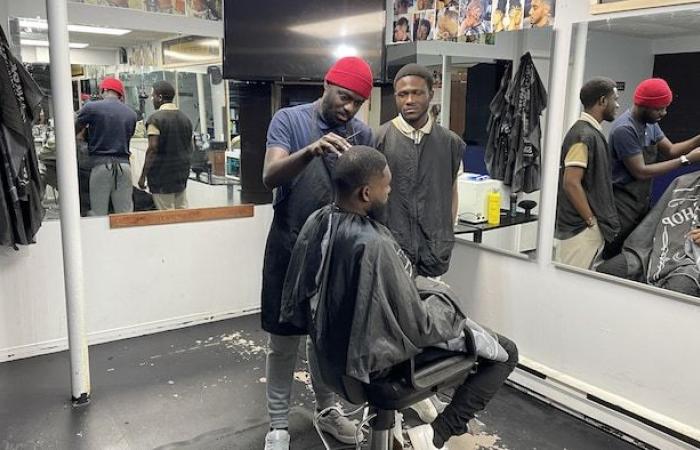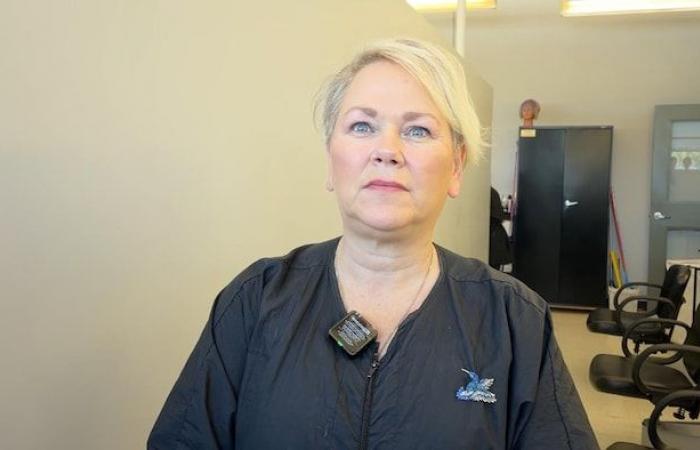In Greater Sudbury, hairdressers with enough expertise to take care of the frizzy hair of Afro-descendant men are not common.
The situation concerned Joël Bikakala, an immigrant of Congolese origin based in the nickel city.
Pastor in the Democratic Republic of Congo, Mr. Bikakala started hairdressing and decided to open a salon to fill a void that he himself noticed upon his arrival 6 years ago.
When I saw people. They had a lot of hair. I said to myself, but is this the culture here? Don’t we do our hair? I asked people and in their answers I understood that there was a lack of hairdressers
he explains.
I told myself that styling hair is something I know how to do well. Why not offer this to the community.
Her hair salon is nestled between a few miscellaneous businesses in downtown Greater Sudbury.
The place is buzzing with activity, customers and hairdressers coming and going.
Chris will come at 4 o’clock, Azael at 3 o’clock, the whole gang will come
we can hear one of the hairdressers say to Mr. Bikakala.
In this salon everything is done by appointment, the hairdressers only come when requested.
Growing need
More and more men with frizzy hair are arriving in Sudbury, keeping pace with growing immigration.
The popularity of Joël Bikakala’s hair salon continued to increase to the point where he decided to train and hire young students.
Open in full screen mode
Joël Bikakala trains and hires young students to help him in his hair salon based in Greater Sudbury.
Photo : - / Désiré Kafunda
A student from Collège Boréal in the Faculty of Business Administration, Chris Atche N’Goyet, was the first to join the adventure.
After my classes I go to the salon depending on the appointments I can have with my clients. For example, if I can have two or three appointments during a 2 or 3 hour break I come to the salon and mainly take care of my clients
he said.
Lack of expertise
The experience that Chris Atche N’Goyet acquires at the salon is valuable, since it is difficult to learn the trade adequately in the city.
The training given in hairdressing schools in the North lacks expertise regarding frizzy hair, according to him.
Mr. N’Goyet remembers the complaints of the first people who used his services.
The first clients I had all commented that they were going to hair salons where no one knew how to handle their hair types
he says.
I had the experience myself when I arrived in Canada. I had to cut my hair. I went to a hair salon. They didn’t know how to deal with my hair type
he continues.
At Collège Boréal, where we educate future hairdressers, we are trying to correct the problem.
Hairstyling program coordinator Monique McDonald explains that frizzy hair is part of the teaching curriculum.
Open in full screen mode
The coordinator of the Collège Boréal hairdressing program, Monique McDonald, invites hairdressers not to be afraid of frizzy hair.
Photo : - / Désiré Kafunda
We have a whole course where we go through all the products and everything you need to use on frizzy hair
she emphasizes.
Ms. McDonald also recognizes the effort that frizzy hair can take.
When it comes to frizzy hair, there are a lot of people who are afraid. They are afraid to cut hair. It’s a hair. As soon as you do it once, that’s when you’ll be more comfortable.
she declares.
A new family
At Joël Bikakala’s hair salon, customers are grateful to finally have at their disposal a place where they know how to take care of their frizzy hair, but also of themselves.
Daniel Makélélé is an international student who is far from home. For him, the living room is a space to meet up.
It’s a place where I feel at home. I feel like I’ve found a new family here
he said.

Open in full screen mode
The international student, Daniel Makélélé, is a regular at Joël Bikakala’s hair salon.
Photo : - / Désiré Kafunda
With the growing number of men with frizzy hair in Sudbury, Joël Bikakala predicts the region will need more hairdressers who know how to deal with this hair type.
He hopes that more members of black communities will dedicate themselves to the profession of curly hair styling.








